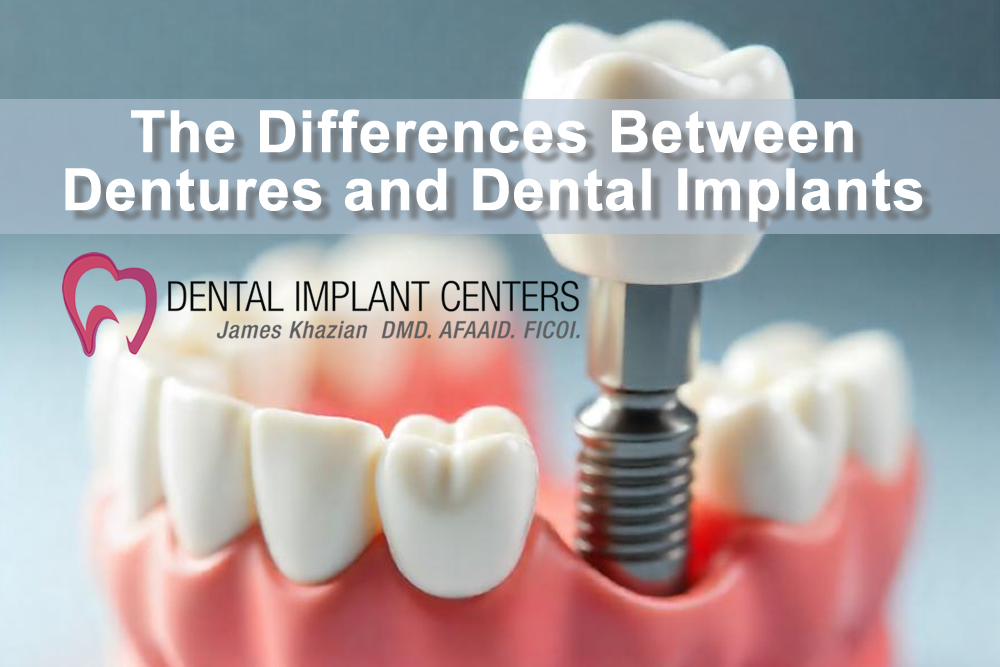Summary
Both dentures and dental implants have their pros and cons. Consulting with a dentist will help determine the best solution based on your needs and oral health condition.
The Differences Between Dentures and Dental Implants
Tooth loss can significantly impact a person’s oral health, confidence, and overall quality of life. Fortunately, modern dentistry offers two primary solutions to replace missing teeth: dentures and dental implants. Both options restore function and aesthetics, but they differ in structure, procedure, longevity, and overall benefits. If you are considering tooth replacement, understanding the differences between dentures and dental implants can help you make an informed decision.
1. What Are Dentures?
Dentures are removable prosthetic devices designed to replace missing teeth. They consist of artificial teeth set in a gum-colored acrylic base. Dentures can be full (complete), replacing an entire arch of teeth, or partial, replacing a few missing teeth while attaching to the remaining natural ones.
Types of Dentures:
- Conventional Full Dentures: Placed after all remaining teeth are extracted and gums have healed.
- Immediate Dentures: Inserted immediately after tooth extraction but may require adjustments as the gums heal.
- Partial Dentures: Used when some natural teeth remain, held in place with metal or acrylic clasps.
2. What Are Dental Implants?
Dental implants are a permanent tooth replacement option consisting of three components:
- Titanium Implant: Surgically inserted into the jawbone to act as an artificial root.
- Abutment: A connector placed on top of the implant.
- Crown: A custom-made artificial tooth that mimics natural teeth.
Implants can replace single teeth, multiple teeth, or even full arches using procedures like All-on-4, where a full denture is secured with four implants.
3. Procedure and Treatment Timeline
Dentures:
- Typically involve taking impressions of the mouth and creating custom-fitted prosthetics.
- If extractions are required, healing may take several weeks to months.
- Dentures are usually ready within a few weeks.
- Adjustments may be needed over time for comfort.
Dental Implants:
- The process begins with a consultation and a surgical procedure to place the titanium post.
- Healing (osseointegration) takes 3-6 months as the bone fuses with the implant.
- Once healed, the abutment and crown are placed.
- The entire process can take several months but results in a permanent solution.
4. Comfort and Functionality
Dentures:
- May feel bulky or uncomfortable at first.
- Can slip or shift while eating or speaking.
- Require adhesive to stay in place.
- May lead to jawbone shrinkage over time, affecting fit.
Dental Implants:
- Feel and function like natural teeth.
- Are securely anchored, eliminating slipping.
- Preserve jawbone integrity by stimulating bone growth.
- Allow normal chewing and speech without restrictions.
5. Maintenance and Longevity
Dentures:
- Require daily removal and cleaning.
- Need relining or replacement every 5-7 years due to wear and jawbone changes.
- Can develop odor if not cleaned properly.
Dental Implants:
- Maintained like natural teeth with regular brushing and flossing.
- Can last a lifetime with proper care.
- Do not require adhesives or special cleaning solutions.
6. Cost Considerations
Dentures:
- More affordable initially ($1,000–$3,000 per arch).
- Long-term costs may increase due to replacements and maintenance.
Dental Implants:
- Higher upfront cost ($3,000–$6,000 per tooth or $15,000–$30,000 for full-mouth restoration).
- Long-term investment due to durability and minimal maintenance.
7. Who Is a Good Candidate?
Dentures:
- Suitable for patients with significant tooth loss and weakened jawbone.
- Ideal for those seeking a non-invasive, cost-effective
Dental Implants:
- Best for individuals with sufficient bone density and good oral health.
- Suitable for those looking for a permanent, natural-feeling
8. Which Option Is Right for You?
Choosing between dentures and dental implants depends on several factors, including budget, lifestyle, oral health, and personal preference.
- If you prefer a removable, more affordable solution, dentures may be the right choice.
- If you seek a long-lasting, stable, and natural-feeling solution, dental implants are worth considering.
Final Thoughts
Both dentures and dental implants have their pros and cons. Consulting with a dentist will help determine the best solution based on your needs and oral health condition. Whether you opt for dentures or implants, restoring your smile can enhance your confidence, improve functionality, and contribute to overall well-being.


